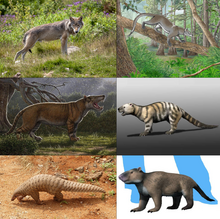
Back أوابد Arabic اوابد ARZ Ferae Azerbaijani Feres (clade) Catalan Ferae Czech Ferae German Ferae Spanish Ferae Basque نارامزیان Persian Ferae Finnish
| Ferae | |
|---|---|

| |
| Scientific classification | |
| Domain: | Eukaryota |
| Kingdom: | Animalia |
| Phylum: | Chordata |
| Class: | Mammalia |
| Grandorder: | Ferungulata |
| Mirorder: | Ferae Linnaeus, 1758[2] |
| Subgroups | |
|
[see classification]
| |
| Synonyms | |
Ferae (/ˈfɪəriː/ FEER-ee, Latin: [ˈfɛrae̯], "wild beasts") is a mirorder of placental mammals[9][10] in grandorder Ferungulata, that groups together clades Pan-Carnivora (that includes carnivorans and their fossil relatives) and Pholidotamorpha (pangolins and their fossil relatives).
- ^ Sean P. Heighton, Rémi Allio, Jérôme Murienne, Jordi Salmona, Hao Meng, Céline Scornavacca, Armanda D. S. Bastos, Flobert Njiokou, Darren W. Pietersen, Marie-Ka Tilak, Shu-Jin Luo, Frédéric Delsuc, Philippe Gaubert (2023.) "Pangolin genomes offer key insights and resources for the world’s most trafficked wild mammals"
- ^ "'Ferae' – The Linnean Collections". linnean-online.org. Retrieved 26 February 2020.
- ^ Haeckel, Ernst (1866.) "Generelle Morphologie der Organismen." Berlin: Georg Reimer.
- ^ Haeckel, Ernst (1895). Systematische Phylogenie: Wirbelthiere (in German). Vol. T.3. Berlin: G. Reimer.
- ^ Zagorodniuk, I. (2008.) "Scientific names of mammal orders: from descriptive to uniform" Visnyk of Lviv University, Biology series, Is. 48. P. 33-43
- ^ Kalandadze, N. N. and S. A. Rautian (1992.) "Systema mlekopitayushchikh i istorygeskaya zoogeographei [The system of mammals and historical zoogeography]." Sbornik Trudov Zoologicheskogo Muzeya Moskovskogo Goschdarstvennoro Universiteta 29:44–152.
- ^ Edward Newman (1843.) "The Zoologist: a monthly journal of natural history. (Vol. 1)", London, J. Van Voorst
- ^ Amrine-madsen, H.; Koepfli, K.P.; Wayne, R.K.; Springer, M.S. (2003). "A new phylogenetic marker, apolipoprotein B, provides compelling evidence for eutherian relationships". Molecular Phylogenetics and Evolution. 28 (2): 225–240. Bibcode:2003MolPE..28..225A. doi:10.1016/S1055-7903(03)00118-0. PMID 12878460.
- ^ McKenna, M. C. (1975). "Toward a phylogenetic classification of the Mammalia". In Luckett, W. P.; Szalay, F. S. (eds.). Phylogeny of the Primates. New York: Plenum. pp. 21–46.
- ^ Cite error: The named reference
McKennawas invoked but never defined (see the help page).